Paulette Bleck has been praying for this day.
She stands at the threshold of her family’s home with her firstborn daughter Mavis in her arms, holding her breath.
Paulette Bleck has been praying for this day.
She stands at the threshold of her family’s home with her firstborn daughter Mavis in her arms, holding her breath.
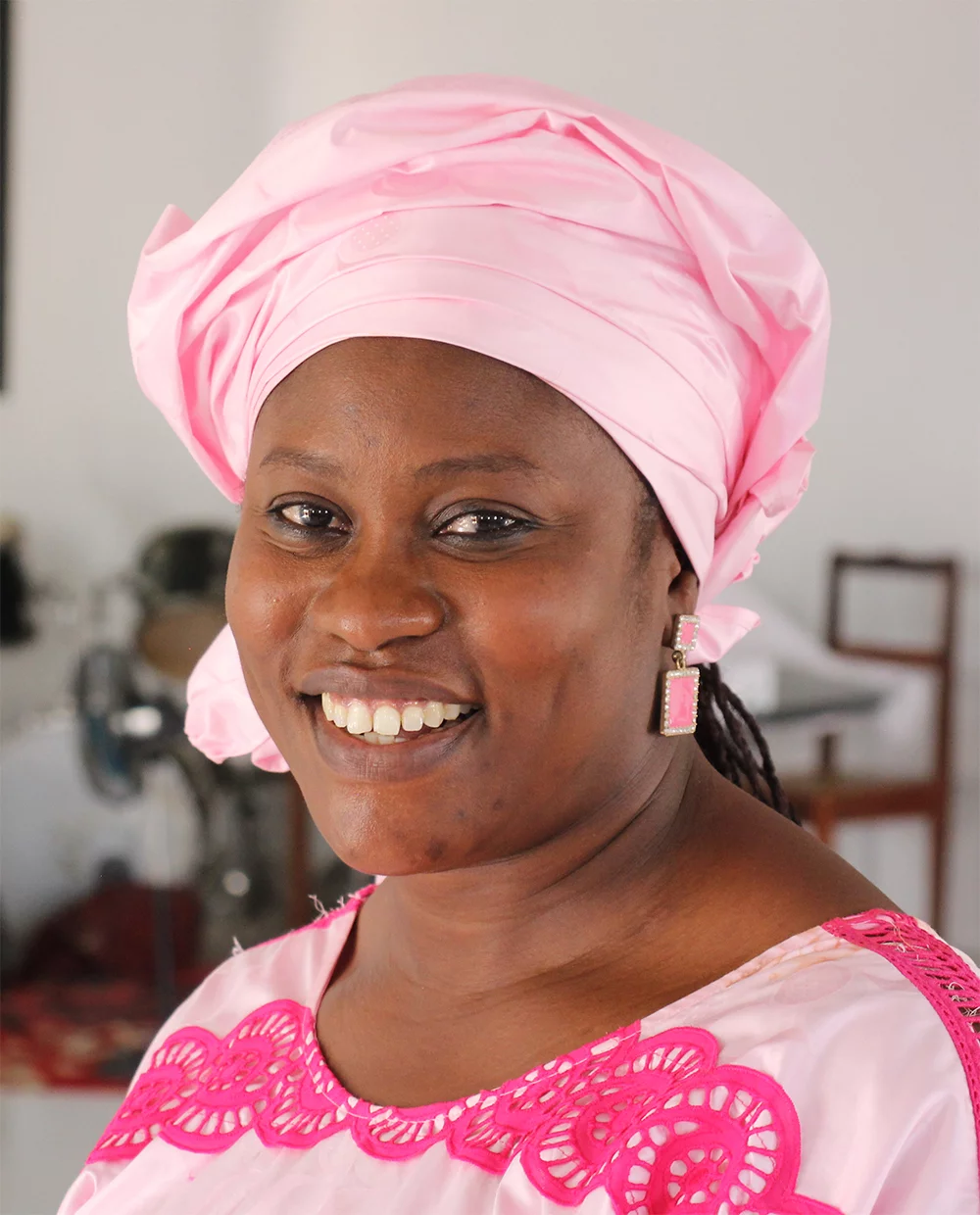 Paulette is a member of the translation team
Paulette is a member of the translation team Could this be the moment her own mother accepts her?
Could this child bring such long-awaited reconciliation?
The door opens, but her mother clearly isn’t happy to see her.
She won’t hold the baby – won’t even touch her. Paulette stays for the whole day, determined to savour each moment despite the awkwardness and pain. She relishes this rare chance to see her mother’s face, and see her sisters. It’s more contact than they have had in years.
Back home that night, Paulette finally allows herself to cry. ‘She’s even further away,’ she tells her husband. Once again, they lift their hands and pray.
When Paulette was studying for the equivalent of A-levels in Senegal, she spent a holiday helping to care for her aunt’s new baby. That was when she met Joseph. A keen pianist, he and a group of other young people met at her aunt’s house for band practice. They became friends, and started to see each other more often.
Joseph was a Christian, though. Paulette’s family were all Muslims. When their relationship became more serious, her family said there was no problem at all – as long as he converted.
So one day Paulette told Joseph, ‘I am going to convert you to Islam.’
He replied, ‘And I want to do everything I can so that you will become a Christian.’
‘For him it was because of his faith, but for me it was the condition imposed by my family,’ she explains.
Paulette had lots of questions about Christianity, so Joseph gave her leaflets and short books of the Bible in French, a language she had learnt at school. ‘He never forced me to become a Christian,’ she says. ‘But he encouraged me to look into it. And when I had difficulties, he encouraged me to pray. Whenever I prayed, I saw the answers.’
Paulette’s family took their faith very seriously. Each morning her uncle would stand in front of the house and everyone came to greet him. ‘He could see who had got up for prayer and who hadn’t.’
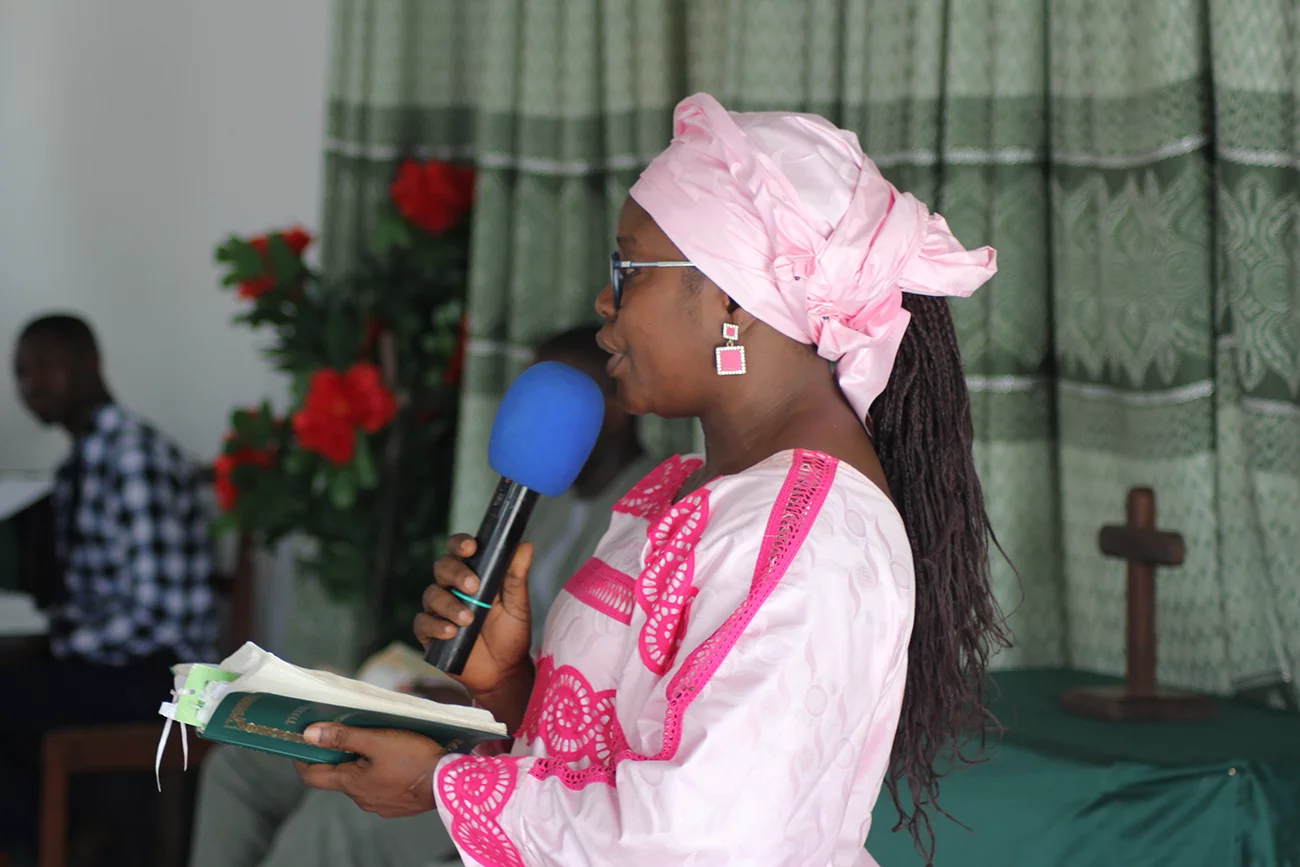 Paulette translating Scripture into Wolof in a church service
Paulette translating Scripture into Wolof in a church service Whenever her parents were away, Paulette had the responsibility of directing the family, and she had always continued to pray diligently. Now, as she grappled with her questions about Jesus, she found it increasingly difficult to participate in these daily prayers. ‘As the Bible says, you don’t light a lamp and stick it under the bed,’ says Paulette, so she told her uncle: ‘I don’t feel like I belong in Islam anymore.’
That wasn’t an option in their family, her uncle said. Her grandfather had brought Islam to his village – a point of pride for them. ‘But he knew that I was not the kind of person to mess around,’ she says. ‘When I say something serious, it’s serious.’
Her uncle was willing to give her time to reflect, but Paulette’s mother was appalled. ‘She stopped speaking to me. She stopped paying my school fees. I had to buy water from her to wash with. Sometimes when they were eating they left me in my room. They were trying to make me change my mind.’
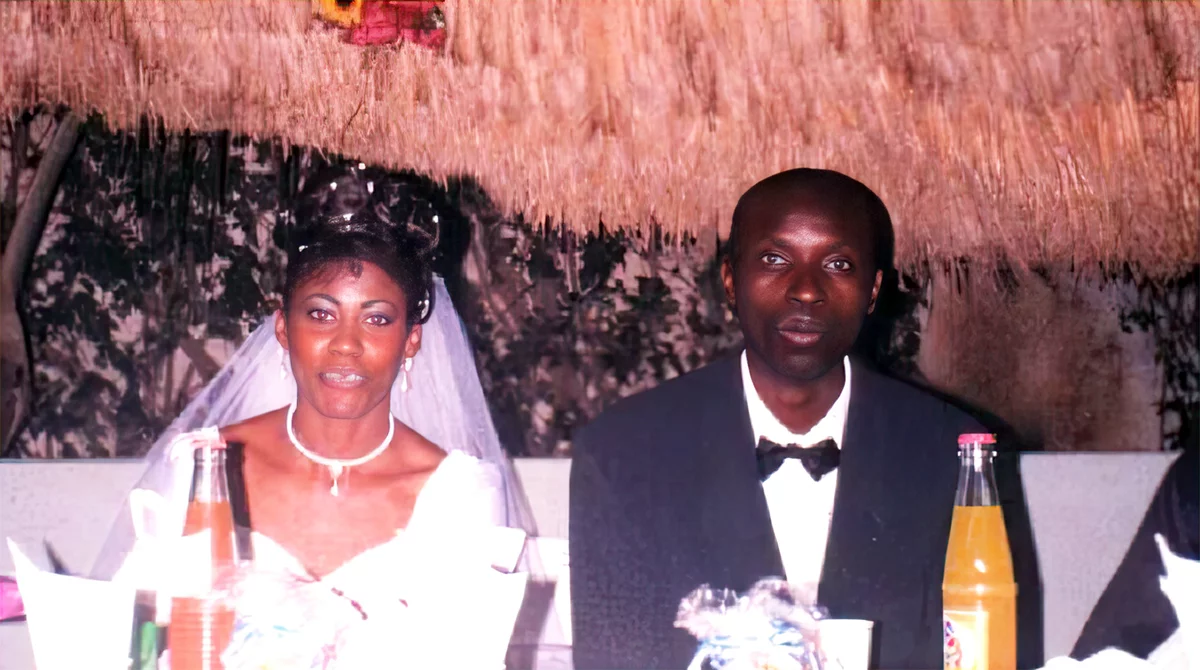 Paulette and Joseph at their wedding ceremony
Paulette and Joseph at their wedding ceremony But Paulette didn’t change her mind – she had decided to follow Jesus. Romans 8:38–39 was a lifeline for Paulette during that time: ‘Neither death, nor persecution, nor height nor depth will separate us from the love of God.’ ‘It is my favourite verse,’ Paulette says. ‘It helped me a lot.’
But living at home was becoming unbearable for Paulette, so she and Joseph decided it was time to get married. ‘We didn’t have a lot of money, but we decided to have a very simple wedding – to be free.’
Soon afterwards, Joseph became a pastor. In 2001, he and Paulette started to lead a church. Since pastors in Senegal generally study theology in French, they are usually more comfortable preaching in French too. As Joseph preached, Paulette translated into Wolof, the language spoken by the majority of people in Senegal.
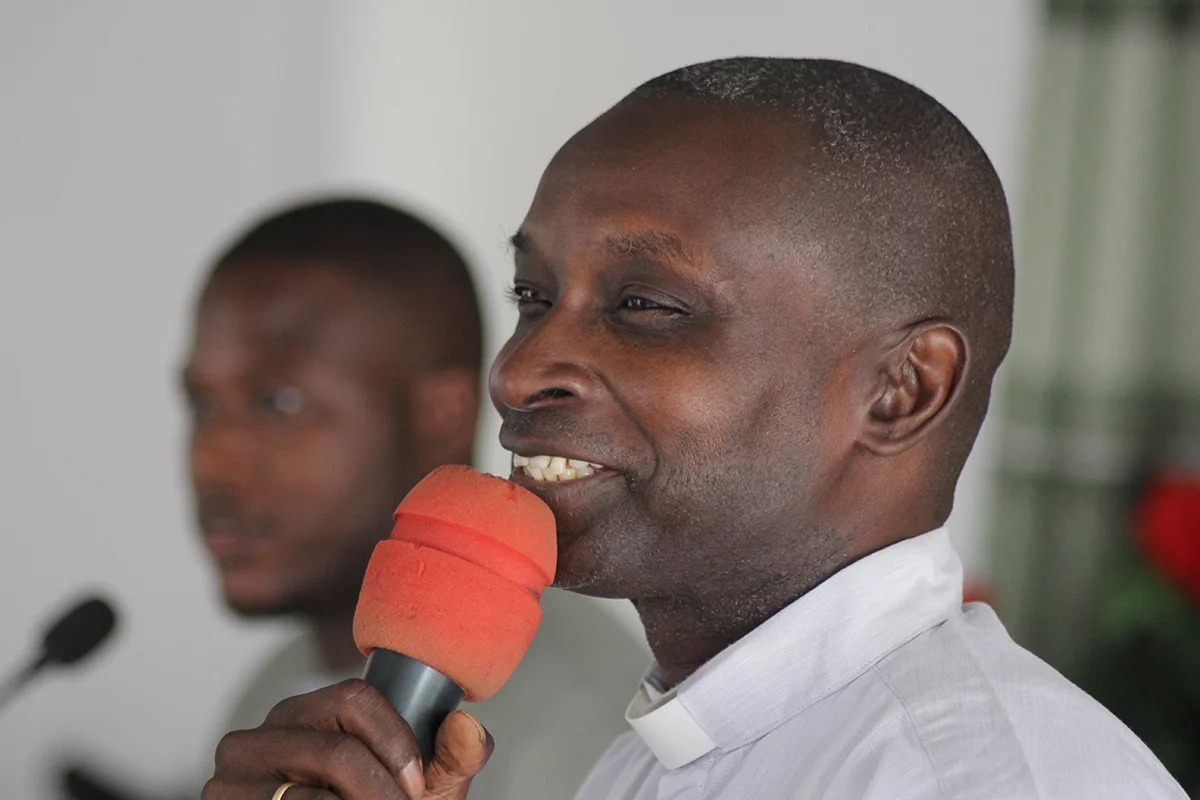 Pastor Joseph teaching in church
Pastor Joseph teaching in church ‘Joseph doesn’t talk much – but when he starts, he speaks quickly. Other translators have a hard time keeping up. Sometimes I finish before him! When he starts a sentence, I know how it will end,’ Paulette explains.
‘My husband was the first one who had confidence in me. He always told me, “Translation is a gift that is in you. Wherever I preach, you will be the one to translate for me.”’
This gift is incredibly valuable, Pastor Joseph explains: ‘The members understand the word of God better when they hear it in Wolof. But not all of them can read it.’
Some years later, Paulette and Joseph heard about a cutting edge project commissioned by the Evangelical Fraternity of Senegal, an alliance of churches. The aim was to translate the Bible into Contemporary Wolof using oral methods.
‘I encouraged her to do it,’ says Joseph. ‘It is what she does at church, and when we work together outside church too.’ So Paulette joined the translation team.
During the years of pressure from her family, Paulette’s French Bible strengthened her with the certain hope she has in Jesus. But many Wolof speakers don’t understand French – particularly women, who often have less opportunity to attend formal education (see box below). The oral form of the translation will make the Bible particularly accessible to them.
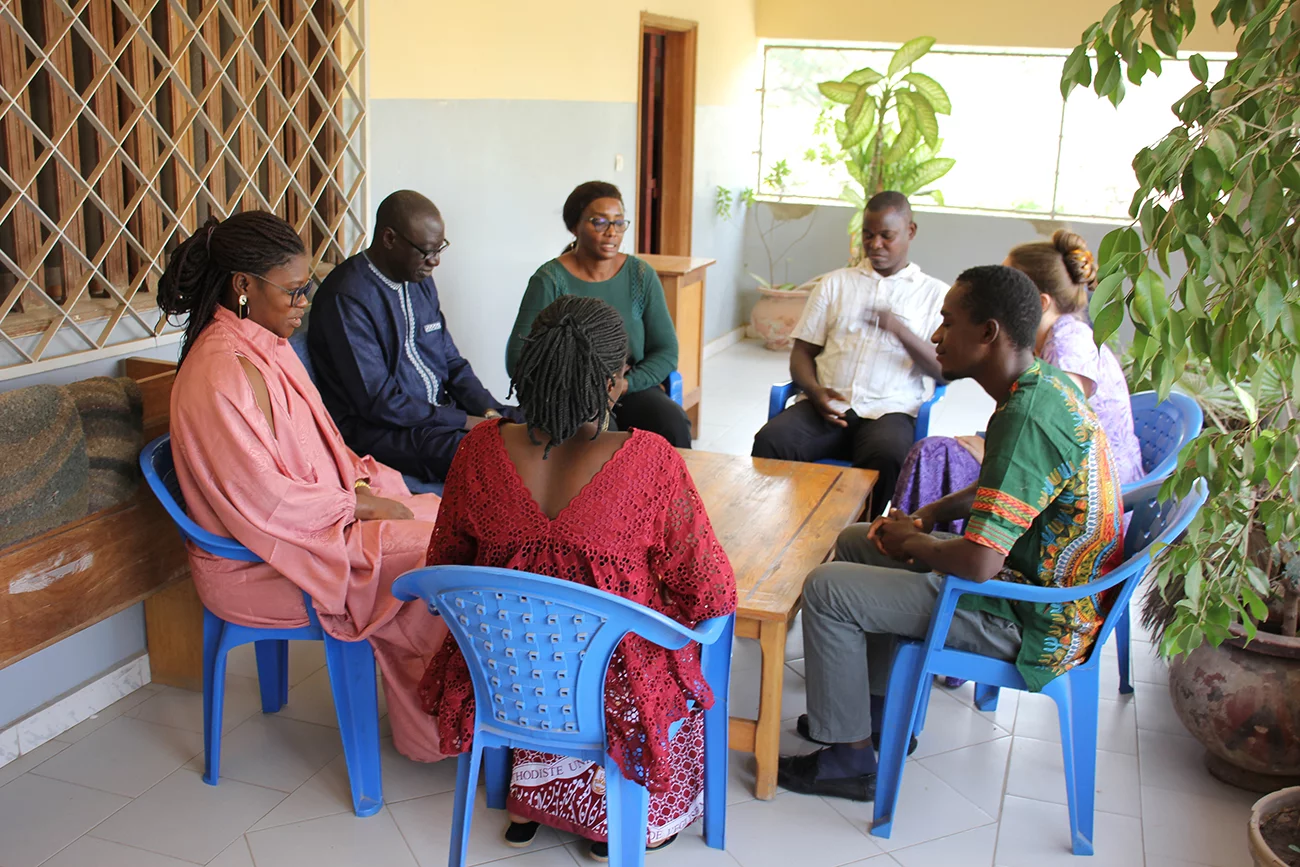 The Contemporary Wolof team prays together
The Contemporary Wolof team prays together After she and Joseph got married, Paulette didn’t hear from her mother for two years. Not only that, but her mother had made a devastating prediction about the consequences of her new faith: ‘Because you are a Christian, you won’t have a baby.’
When her first daughter Mavis was born, Paulette was shocked at her mother’s continued rejection. ‘I didn’t think this would happen – I’ve often seen people have problems, but when you have a child, they let it go. But even seeing her first granddaughter didn’t change anything.’
Joseph had told Paulette that if they had another daughter, she could choose the name. ‘He thought when we had another child it would be a son! The father usually names the children, so it was my only opportunity.’
Paulette and her mother had spoken rarely since that visit five years ago. But when her second daughter was born, Paulette made an incredible decision – to honour the mother she loved, but who had rejected her: ‘I chose the name Emma Faye, after my mother and my aunt.’
This act of grace would be the turning point Paulette and Joseph had been praying for.
‘That was when my mother came for the first time. We’d been married seven years before she came to visit me, and she was everything to me. It was a major victory because we had been praying for that. Since then, she hasn’t gone a week without calling me.’
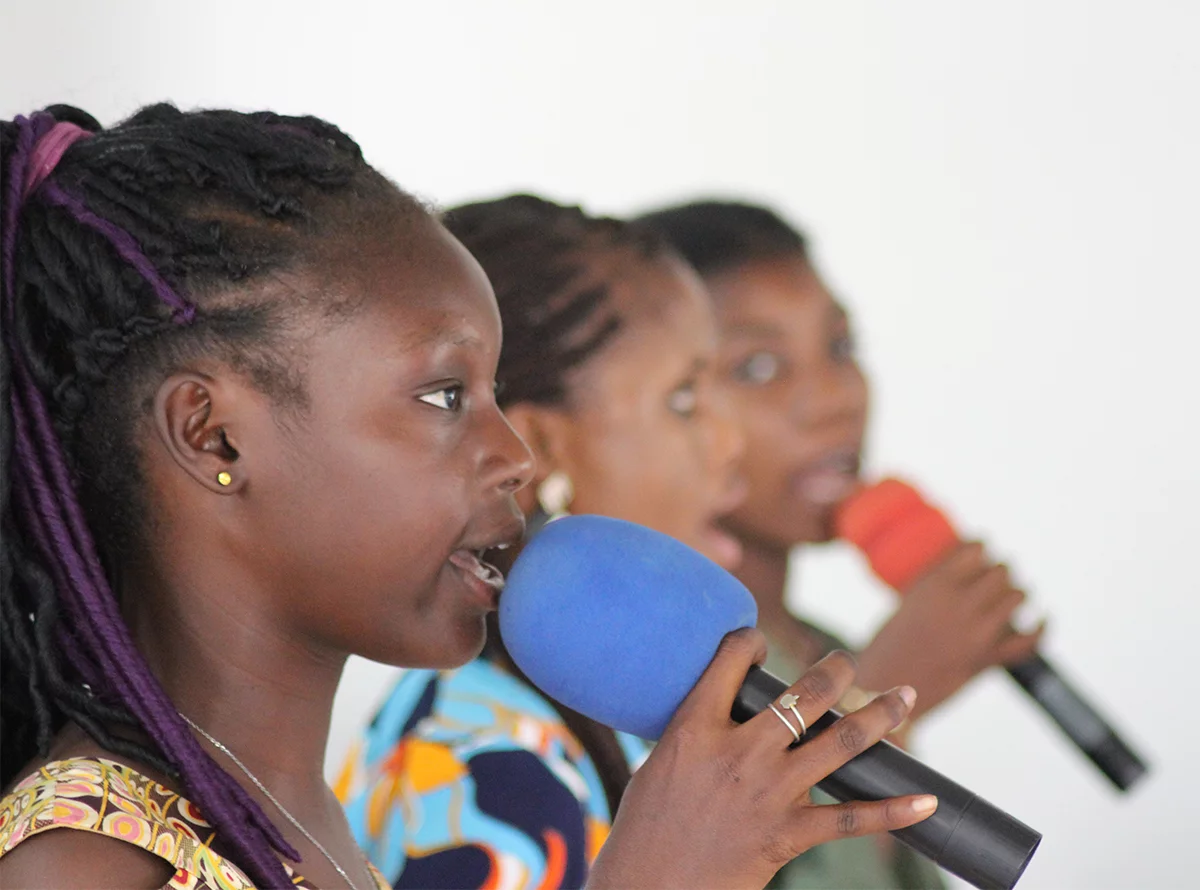 Paulette and Joseph’s daughter, Emma, sings in church
Paulette and Joseph’s daughter, Emma, sings in church The relationship with her family is much better now. ‘They respect my faith, and they accept that I am not a Muslim. Even if they are not happy,’ Paulette laughs, ‘they do their best.’
The Bible is still essential in helping Paulette to stand firm. ‘When I go to my father’s village, I am the only Christian there. If you don’t know your faith, you’re at risk of falling away because there is a lot of pressure.’
Paulette is matter-of-fact as she describes the difficulty of her years as a new Christian: ‘If you read your Bible, you know all of that is normal.’
But for all her patience in her own hardships, she maintains a steady resolve that life can be different for others – for her daughters, for other believers from Muslim background, and for the over 16 million Wolof speakers all over Senegal.
‘We expect that the translation will speak in our families first – I can visit my family and play it to them. As it will be on people’s phones, it can get to places where you are not able to preach. The translation can go where the church cannot.’
For several years, Paulette helped lead a women’s conference, where most of the women didn’t speak French. ‘They were ashamed because they thought they had to speak about the Bible in French,’ she says.
‘We want to join in, but we don’t know how,’ they told her.
Paulette explained that they could study the Bible in Contemporary Wolof, and share it with others in their own language too. Each day she gave them a verse to memorise in Wolof.
‘That’s why this oral translation will help them,’ she says. ‘They will be able to listen and know that they can grow in their faith. There shouldn’t be barriers to knowing God. Each person should be free to wake up each day and know: there is a God who is Lord over everything, and I can talk to him.’